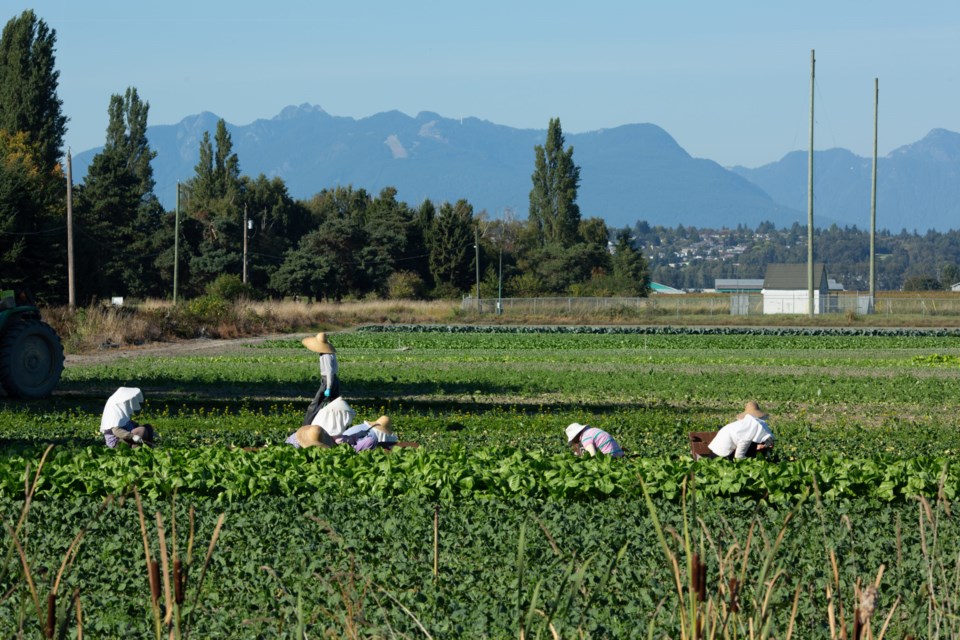There was a time when the family farm fed most of British Columbia. Those were the pastoral days of old, when the family farm was just that – mom, pop, and a pasture full of kids to milk the cows. They were modest but making it, a lifestyle as much as a living.
Today, agricultural operations are almost wholly reliant on foreign workers for the seasonal harvest. And so, just like that, the global pandemic has put B.C.’s already precarious farm and ranch industries on the brink.
Agriculture Minister Lana Popham says there is an immediate shortage of 6,000-8,000 workers for the agricultural sector, owing mostly to border closures over COVID-19. The vast majority of seasonal agriculture workers in B.C. come from Mexico and South Asia.
The province launched an online jobs board this week to try and fill the void. The B.C. Farm, Fish and Food Job Connector aims to match job seekers with farmers, fish harvesters and food processors looking at a largely lost season if they can’t find seasonal workers.
That’s a sector that generated $15 billion in revenues for B.C. in 2018. Jobs need to be filled in more than 30 communities throughout B.C. from the North to Metro Vancouver and the Island.
I hope the job connector works. Really, I do.
But there are many challenges for the agricultural work force, and an online job board won’t address them.
Families are smaller. The costs and expectations for living are higher. The family farm is not a get-rich-quick kind of life but, rather, a labour of love from sun up to sun down.
There are many challenges for the agricultural work force, and an online job board won’t address them.
You know what they say about farm work: It’s hard, sometimes dangerous, and precarious work – but at least it pays poorly.
Then there’s the consumer addiction to cheap and convenient: we want strawberries in winter; we want them from the same place we can buy a bra and lightbulbs; and we want them for a few dollars a pound, dammit.
The cost of land and equipment for farming and ranching are high, and the Big Ag approach means most are subject to market conditions far beyond their control.
The Agricultural Land Reserve system is in dire need of review.
In the B.C. Interior, most of the large historic ranches are now the hobby horses of wealthy foreign owners. That includes the Alkali Lake Ranch, the oldest in B.C., which sold to the Douglas Lake Cattle Company in 2008. Douglas Lake also owns the namesake ranch and the Quilchena Cattle Company near Merritt, the James Cattle Company near 100 Mile House, and the Cotton Ranch and Riske Creek Ranching in the Chilcotin.
All in, the company owned by American billionaire Stan Kroenke owns 271,000 acres of B.C. ranch lands, with grazing rights to an additional 1,000,000 acres. We’ll talk about the water rights that go with those deeds some other time. Kroenke is a real estate mogul and owner of the NFL’s Los Angeles Rams, the NBA’s Denver Nuggets, the NHL’s Colorado Avalanche, and the Arsenal football club in the U.K.
The Agricultural Land Reserve system is in dire need of review.
It was, by the way, the Douglas Lake Cattle Company that was embroiled in a 30-year legal battle with the Nicola Valley Fish and Game Club over public access to lakes, which cannot be privately owned in British Columbia. The Fish and Game Club won but it cost them.
The historic Gang Ranch is owned by Saudi Sheik Ibraham Afandi. Certainly, there are others but B.C. is the only western province that doesn’t track or have any restrictions on foreign ownership of agricultural land. Alberta, Saskatchewan and Manitoba all do.
There are long-term reforms needed to address many of the problems that plague the homegrown agricultural system in B.C. Like so many other industries, the current crisis has served to highlight the weaknesses that have festered for some time.
In the meantime, consumers can help by buying direct from farms. Shop at farmer’s markets, or opt for a farm fresh subscription box, which many mom-and-pop operations are now offering on a weekly or monthly basis. Buy B.C. in the grocery store, at least.
And if you’re looking for a job, try picking berries or beets for a summer. You’ll never complain about prices again.
Dene Moore is an award-winning journalist and writer. A news editor and reporter for The Canadian Press news agency for 16 years, Moore is now a freelance journalist living in the South Cariboo. Moore’s two decades in daily journalism took her as far afield as Kandahar as a war correspondent and the Innu communities of Labrador. She has worked in newsrooms in Vancouver, Montreal, Regina, Saskatoon, St. John’s and Edmonton. She has been published in the Globe and Mail, Maclean’s magazine, the New York Times and the Toronto Star, among others. She is a Habs fan and believes this is the year.
SWIM ON:
- Dene Moore last wrote that you’ll be paying a lot more for beef this summer. But producers and feedlots won’t be seeing the benefits.
- Robert Wager: All the food we eat - and I mean all - has been genetically modified by humans.
- One way to support local farmers, and stay a safe social distance apart? Farmers' markets. Jody Vance explains how.



